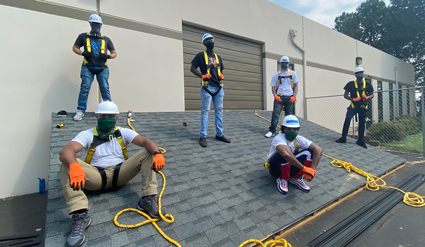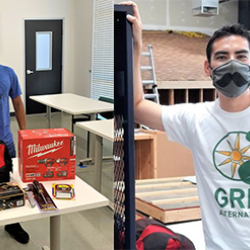It was only the second day of GRID Central Valley’s latest training series when the orders came down: all Californians had been instructed to shelter in place due to the rapidly growing COVID-19 pandemic. Training was immediately put on pause while the Central Valley team worked quickly to develop a contingency plan. In the following days and weeks, similar lockdowns and restrictions fanned out across the country, posing a unique challenge for GRID’s hands-on training programs.
In the Central Valley (CV), eight trainees were able to wait out the pause in the program and come back to a newly adapted socially-distanced training program. A maximum of six trainees are now allowed in the training lab, which has safety signage, hand-sanitizing and cleaning stations, and socially distanced desk and work spaces. The training lab includes a mock roof that gives trainees a chance to experience installing solar using fall protection.
“It’s amazing how our organization has been able to be so creative and find avenues to continue our training,” explained Karina Gonzalez, CV’s Workforce Development Director.
 On the other coast, the lockdowns occurred during the third week of a training program led by GRID Mid-Atlantic’s Workforce Training Supervisors Dominic “Dom” Paul-Baha and Ayaz Porter. The team immediately switched to online training, streaming themselves online as they demonstrated installation techniques.
On the other coast, the lockdowns occurred during the third week of a training program led by GRID Mid-Atlantic’s Workforce Training Supervisors Dominic “Dom” Paul-Baha and Ayaz Porter. The team immediately switched to online training, streaming themselves online as they demonstrated installation techniques.
“It was a little bit challenging, because the turnaround time was instant,” explained Dom. “Some people weren’t able to attend the online training, so we had to print packets and drop them off at people’s homes.” After a while, the DC Department of Employment provided iPads to the participants, which improved the training experience.
In response to the changing times, Greater Los Angeles (GLA) saw an opportunity to advance GRID’s mission of equity and access, particularly around emerging technology needs. David Andrade, GLA’s Training Specialist, advocated, “Our trainees need better access to technology.” Through partnerships with nonprofits, GLA was able to offer Chromebooks to trainees who needed laptops and/or hotspots for the duration of their internships. This transition presented itself as an opportunity to directly connect with the community without the associated cost of transportation, such as time and distance.
GLA continues to be creative, discovering new ways to support trainees in this space. The GLA team believes they will maintain and implement some new practices as standard for a more well-rounded training program in the long-term. Adewale OgunBadejo, GLA’s Workforce Development Manager, noted, “As technology advances we are committed to ensuring that vision continues to include everyone.”
To be able to continue to do [the training], it’s a challenge, but it’s also rewarding,” said Karina. Despite the ongoing challenges, there’s still much to celebrate. Of Central Valley’s recent cohort of eight graduates, seven are currently employed in the solar industry, proving there are still opportunities in the solar industry as well as a real need for training programs like GRID’s.
To celebrate, the Central Valley team hosts individual socially-distanced graduations for their trainees. “Graduation is the most important part of what we do. For some of the trainees, this is the first graduation they’ve had. We still have to celebrate their accomplishment,” said Karina.
As GRID’s workforce departments are adapting, affiliate offices are sharing best practices with each other. “We’ve been working together more than ever. GRID has united as one during these tough times,” said Dom, noting that the Mid-Atlantic office is now exploring hybrid in-person and online options.
While we all grow accustomed to this new post-pandemic reality, one thing is certain - our workforce development teams across the country will continue to adapt, infuse their work with positivity, and always keep an eye to the future to ensure our trainees are given the best opportunities for success.

